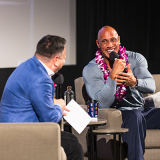Professor Ross Brown talks about writing for Internet TV
April 26, 2011
Here’s an excerpt from an interview I gave recently, visit WriteOnLine.com to read the whole interview:
Author Q&A: Ross Brown, “Byte-Sized Television”
Ross Brown is the author of Byte Sized TV: Create Your Own TV Series for the Internet, published by Michael Wiese Productions. He has written and produced more than 300 episodes of network television and has created series for ABC, CBS and the WB. Brown is currently an Assistant Professor at the Dodge College of Film and Media Arts at Chapman University where he teaches TV writing and production.
Read Ross Brown’s Expert Article on Writing a TV Spec.
What inspired you to write Byte-Sized Television?
I teach in the film school at Chapman University. In late 2006 the Dean asked if I could teach an experimental class in “creating short videos for iPods and the Internet.” I had been thinking along the same lines and even had a name in mind for the course: “Byte-Sized Television.” But when I went looking for a text for the class, I found that despite the explosion of user-generated video on the Internet, especially YouTube, there was no book dedicated to creating short-form series for the Web. The class quickly became part of the regular curriculum, but still no book. It just felt like I was a character in L.A. Story and the giant Freeway Sign was flashing a message at me that read WRITE THE BOOK YOURSELF. So I did. YouTube is now the fourth most popular website on the planet and still my book is the only one dedicated to creating Web Series.
What was your process for writing it? Getting it published?
I pitched the idea to a well-known publisher of film and TV books. The editor was intrigued and asked for a table of contents and sample chapter. I delivered these, then waited … and waited … and waited. Finally, after six months, the editor confessed that her sales staff had doubts that the Internet generation would buy a book. So I asked a teaching colleague who had published with Michael Wiese Productions to introduce me to them. He did, they asked for the TOC and sample chapter, I sent them and had an offer within a week. I wrote the book over the course of about a year.
Researching “the world of web series” was a challenge as it changed faster than I could write. But the fundamentals of story and character and visual storytelling weren’t changing—just the online marketplace and how these storytelling principals were being incorporated into the short form. So I decided to use examples of the storytelling principals from both the Web and traditional film and TV, and agreed with the publisher to update the marketplace segment on a regular basis via my website www.bytesized.tv.
What is your favorite part of being a writer? The greatest challenge?
I love creating worlds and characters and stories out of thin air … or at least out of the thin air that resides beneath my thinning hair. Then, to have an audience immerse themselves in that world you’ve created and be entertained or moved by your creation—well, that is a genuine thrill. It’s like someone telling you how great they think your children are.
The greatest challenge is staying disciplined, continuing to write and create on a regular basis despite 1) the other demands on your time, and 2) the unavoidable fact that rejection is more common than publication or purchase of your work. You have to believe in yourself and keep working at it. My book is a perfect example: I heard “no” first and had to keep looking to find the person willing to say “yes.”
Why someone should consider creating a web series?
In a word: OPPORTUNITY. The opportunity to have your work seen by a wide audience without having to wait for a studio or network to greenlight your project. The opportunity to maintain creative control—again, you are in charge, not the suits. The opportunity to see your vision executed, not just on the page, but on the screen. And for those just breaking into the world of film and TV, the opportunity to be a creative voice rather than a production assistant hoping to get the chance to be creative five, ten or fifteen years down the road.


